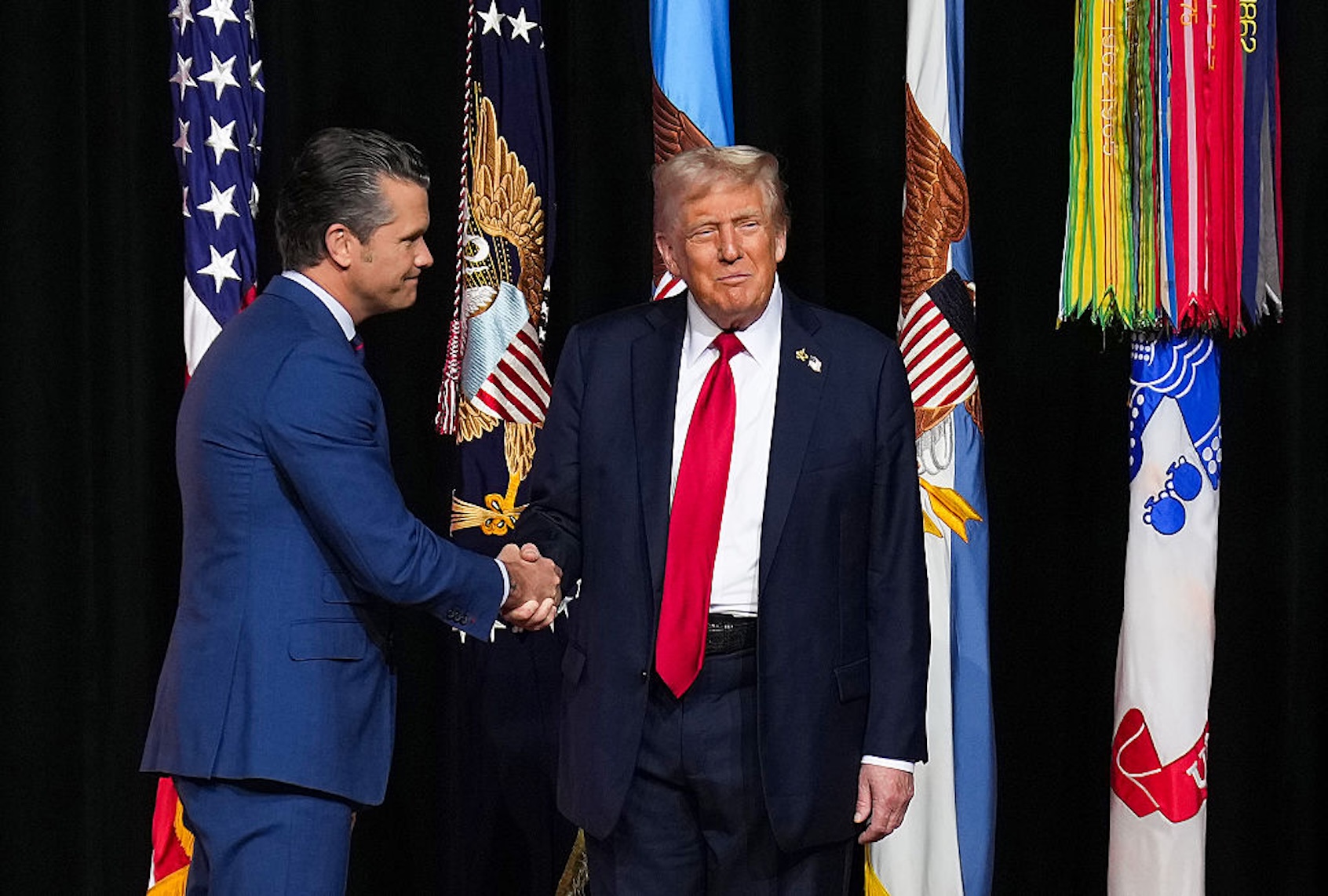President Donald Trump on Monday threw a potential lifeline to Democrats holding out for an extension of expiring health insurance subsidies in exchange for voting to reopen the government, which has been partially shuttered for almost a week.
In impromptu Oval Office remarks, Trump said he was open to continuing, in some form, the expanded premium tax credits for coverage purchased on government-run exchanges.
“We have a negotiation going on right now with the Democrats that could lead to very good things, and I’m talking about good things with regard to health care,” Trump said. “If we made the right deal, I’d make a deal.”
The president quickly added, however, that the current tax credits have led to “billions and billions of dollars … being wasted,” which has been one of the chief critiques of conservatives opposed to the extension of the current policy.
Trump later clarified in a Truth Social post that negotiations haven’t begun yet, and that he’d only talk to the Democrats about health care once they “allow our Government to re-open.”
Insurers are setting their policy rates ahead of open enrollment, which starts Nov. 1 in most states. Without the bigger tax credits, premiums are expected to more than double, on average, for policyholders across the country — with 3 out of 4 living in GOP-leaning states, according to KFF research.
Most Americans support renewing the bigger health insurance subsidies, including 59 percent of Republicans, according to the latest KFF tracking poll, conducted the last week of September.
But Americans are also divided on the wisdom of keeping the government closed until there’s a deal; Less than half of Democrats polled by CBS News last week agreed that it was “worth a shutdown” for their party to advocate for their position.
The Oct. 15 military pay date is another pending deadline that could force action. Over 2 million servicemembers could be forced to continue working without a paycheck until the shutdown is over if the government is not reopened by then.
Military personnel have never gone without pay during previous shutdowns. During the 2018-19 funding lapse, the fiscal 2019 Defense appropriations bill had previously been signed into law. In 2013, Congress passed separate legislation to ensure the troops got paid on time.
Familiar talking points
After six days of the shutdown, however, there were no outward signs of movement on Capitol Hill despite Trump’s apparent olive branch on the health care tax credits. Republicans say those discussions will take time and can only happen once Democrats agree to reopen the government.
Before Trump’s clarification via social media, Democrats said there were no actual negotiations happening yet.
“Trump’s claim isn’t true — but if he’s finally ready to work with Democrats, we’ll be at the table,” Senate Minority Leader Charles E. Schumer, D-N.Y., said Monday.
House Minority Leader Hakeem Jeffries, D-N.Y., told reporters Monday that the White House has gone “radio silent” since congressional leaders met with Trump a week earlier.
“Neither Leader Schumer or myself have heard a word from the administration about resolving this issue, making clear to us that the White House wanted to shut the government down to continue the chaos that they’ve been inflicting on the American people since Day One of this presidency,” Jeffries said.
It’s not clear how quickly talks to renew some form of expanded health care tax credits could bear fruit, if and when they start.
Senate Majority Leader John Thune said that the appetite for extending the enhanced subsidies is a “mixed bag” in the GOP conference.
“There may be a path forward,” Thune, R-S.D., said Monday. “I think a lot of it would come down to where the White House lands on that, but certainly not without reforms. I mean we all know the program is broken and needs to be fixed.”
It would cost about $35 billion annually to renew the current tax credits rather than allow the subsidies to shrink back to their pre-pandemic size at the end of this year as scheduled. Republicans have said they want to cap eligibility based on income, for instance, and do more to verify enrollees’ eligibility to guard against fraudulent claims.
Sen. Josh Hawley of Missouri is among the Republicans who want to continue some form of enhanced premium support. “I’m willing to consider, you know, various reforms, but I think we have to do something … and we need to do it sooner rather than later,” Hawley said. If not, he said, it “will result in my state in almost a doubling of premiums.”
Hawley stuck to GOP messaging, however, that Democrats need to first vote to reopen the government before those talks can really begin.
Thune said Democrats are looking for a “guaranteed result” on extending the subsidies, something Republicans are not willing to offer.
“We can assure them that we’ll have a conversation about it, which I’ve said repeatedly, as you know,” he said. “I just don’t know how that happens… while we’re sitting in a shutdown.”
Meanwhile, the House remains out of session other than for pro forma meetings, as it has been since Sept. 19 when that chamber passed the seven-week stopgap funding bill that’s been sitting in the Senate.
In another round of futile voting Monday, the Senate rejected both that GOP-written legislation and Democrats’ alternative, which has a nearly $1.5 trillion wish list of policies, including a permanent extension of the current health care tax credits.
Rank-and-file Senate Republicans and Democrats have engaged in informal discussions but haven’t been able to form a consensus that would unlock five additional Democratic votes needed for cloture on stopgap funding.
Republicans have been telling Democrats they’ll start talking about health care, and full-year appropriations bills that would support both parties’ priorities, as soon as the government is open. But that hasn’t been good enough for Democrats, who want more firm assurances from the GOP.
In fact, there were some signs that talks were moving in the wrong direction.
Sen. Angus King, I-Maine, who caucuses with Democrats and is one of the three caucus members so far who’ve backed the GOP continuing resolution, did so again Monday night. But he said he was “considering” changing his vote in the future because Republicans aren’t offering specific concessions.
“I think this problem is urgent,” King said. “And just saying … ‘Well, we’ll have conversations about it,’ is not adequate.”
Appropriations conference
For Republicans, part of the conversation has always been about buying time to get fiscal 2026 appropriations bills done. They’ve argued the health care tax credits, originally enacted as part of then-President Barack Obama’s 2010 health care law and expanded to their current form under President Joe Biden during COVID-19, should be a separate discussion.
During the informal discussions in the Senate, Republicans have consistently brought up their willingness to bring bipartisan, negotiated spending bills to the floor, such as the three-bill package that’s an initial focus: Military Construction-VA, Agriculture and Legislative Branch. Republicans in both chambers have said they’re willing to keep going with additional “minibus” packages beyond that.
Speaker Mike Johnson, R-La., said Monday he had a “fruitful discussion” with Senate Appropriations ranking member Patty Murray over the weekend about moving forward with the appropriations process after the shutdown ends.
Johnson said he told Murray that he would work to advance the Agriculture, Legislative Branch and Military Construction-VA package after a conference committee reaches agreement.
“Whatever the conference committee comes up with I will put on the floor,” Johnson said. “I’m ready to go, but we’ve got to open the government up so that they can move to that next level.”
Murray, D-Wash., responded to Johnson’s public comments on the social platform X. She said she told Johnson that he and Thune must agree to negotiate with Jeffries and Schumer.
“Premium hikes are going out THIS MONTH,” she wrote. “We need a deal that reopens the government and stops premiums from doubling.”
Aris Folley, Sandhya Raman and John T. Bennett contributed to this report.
Source link


